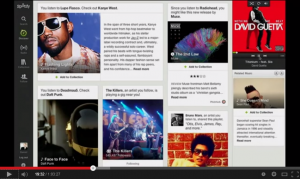Recently Spotify’s Daniel Ek introduced Spotify Discovery (read the wrap up here). In his speech he pointed out the benefits of context for music discovery. So just to pick up his point, here’s what I think are the three stages of music discovery – radically simplified.
1) User searches
2) Recommendations
3) Context
In the most simple form, music streaming services offer their users access to music. To find something to listen to they would have to enter a band or song into the search tool to find what they wanted to listen to.
In the next step, recommendations, the tool will suggest something to listen to. This may be based on the user’s history, other users, genre-classification or whatever.
The next stage adds an extra layer of context on top of that. Instead of just giving recommendations, the tool will add context – why should you listen to a given song or album.
Let’s see what comes next!


 After the music streaming services
After the music streaming services  Deezer UK today pulled quite a trick today: They got about 2,000 (from 499,508 to 501,503) likes in less than 12h.
Deezer UK today pulled quite a trick today: They got about 2,000 (from 499,508 to 501,503) likes in less than 12h. As much as I appreciate Neil Young as an artist, I very much don’t agree with this sentiment. For one, if a song is played on the radio, the artist gets royalties. Second, the radio, as opposed to pirated music, is not a substitute for a CD or a legal download (turns out home taping is, after all, not
As much as I appreciate Neil Young as an artist, I very much don’t agree with this sentiment. For one, if a song is played on the radio, the artist gets royalties. Second, the radio, as opposed to pirated music, is not a substitute for a CD or a legal download (turns out home taping is, after all, not  Rhapsody
Rhapsody 